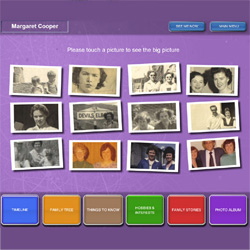Recent Stories
- Businesses urged to tap into science and technology young talent
- Digital relay baton enables remote crowd cheering of athletes
- Health Innovation Campus moves a step closer
- £7.1 million R&D boost for North West businesses
- Centre of excellence created for the next industrial revolution
- Artificial intelligence toolkit spots new child sexual abuse media online
- Strategic partnership set to help plug cyber security skills gap
- What your choice of smartphone says about you
- InfoLabTree: Discover the Story
- novi.digital Launch Event - 'An Event to Help Businesses Grow Online'
RSS Feeds
RSS feeds can deliver the latest InfoLab21 news and events direct to your browser without you having to visit the website.
In most browsers you can click on an RSS link and choose to subscribe to the feed to add it to your favourites or bookmarks.
Software To Help People With Dementia Wins £10,000 Award
Story supplied by LU Press Office

A computing researcher at Lancaster University has been awarded £10,000 to promote software she developed to help improve the care of people with dementia.
Dr Gemma Webster spent three years working on the 'Portrait' project, which saw her develop software to act as a communications bridge between carers and people with dementia.
She was one of three winners of the Research Councils UK 'Telling Tales of Engagement' competition which rewarded academics from across the country able to demonstrate the significant impact of their digital economy research.
The £10,000 prize will help her publicise and promote Portrait with the aim of significantly increasing the number of care homes using the software to improve the relationship between carer and patient.
Portrait consists of interactive multimedia presentations that contain brief biographical and personal information relevant to a particular person with dementia. This helps busy care staff working with that individual to learn about his or her past in a relatively short time, and enables them to improve the quality of care they deliver.
The multimedia biography is immediately accessible to staff through a touchscreen terminal, and Portrait consists of different topics of information about the person with dementia: Timeline - my life events; Family Tree - my family; and Things to Know.
Dr Webster said that it can be very difficult for staff to get to know the individuals with dementia because they often have communication difficulties.
She said: "Yet, without exception all of these individuals have had lives full of incident and relationships, jobs, hobbies, awards, and interesting experiences. Establishing some form of communication between carers and people with dementia can have vital implications for their health and well-being.
"Learning about a person's past may help the care giver by providing interesting and important information from which to stimulate discussion and communication. This information can be difficult to obtain through patient records or discussions with family especially when the health or medical situation often takes priority, and that's where Portrait comes in."
The digital economy has been highlighted as a key area of RCUK investment that can demonstrate impact across society and the economy, and defines impact as embracing the diverse ways that research-related skills benefit individuals, organisations and nations.
The 'Telling Tales of Engagement' competition aimed to capture the wider, non-academic impact of the research and to help researchers to tell their story in interesting and engaging ways to a wider audience.
Dr Webster, who completed her PhD at Dundee University before taking up a postdoctoral position in the School of Computing and Communications at Lancaster University, said the funding would hopefully lead to more care and nursing homes using Portrait.
"The most important thing now is to raise awareness and get more care homes and families involved in the project. We will look at how best to go about this, but we know the key is to get as many people involved as possible.
"It's really good to have won this award and to have the chance to promote and publicise the project more widely. I think it's very important to encourage care givers to get to know the person they are working with rather than just seeing them through the label of dementia or in terms of the physical needs they have. This prize will help us to get that message across."
Fri 02 December 2011



